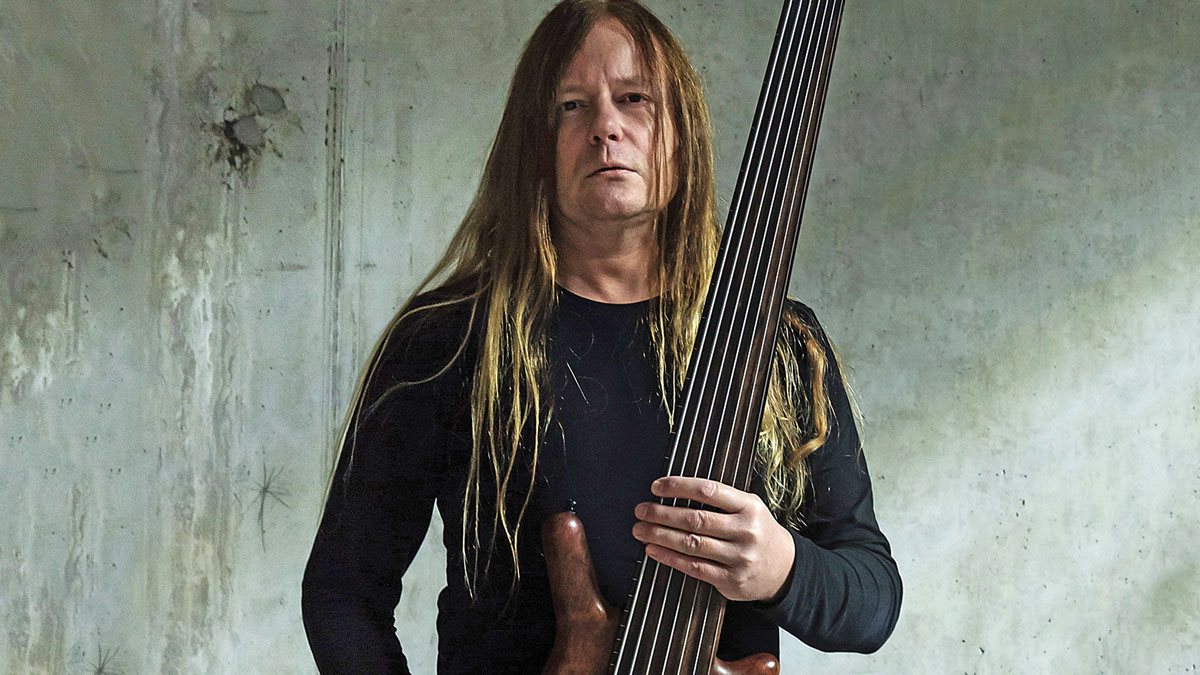Obscura's Jeroen Paul Thesseling on his 5 best bass albums
Thesseling’s story is one of experimental fretless meets metal, breaking new ground with progressive Dutch death-thrashers Pestilence and advancing technical death metal with Obscura

Armed with a fretless seven-string Warwick bass guitar, the Dutch musician Jeroen Paul Thesseling has decades of experience with the death metal bands Obscura and Pestilence, as well as his own solo albums.
He began his musical endeavors as a violinist before picking up the bass at the age of 16. From there, he studied at music college in the Netherlands, and joined Pestilence, with whom he made his first recordings.
Thesseling’s parents were big fans of baroque music, which the bassist credits as an influence on his understanding of harmony, chord structure and counterpoint. He also studied jazz bass, and continued to explore the world between the frets. Indeed, those frets were soon obsolete: He switched to fretless in order to explore different tone systems.
Thesseling constantly challenges his own technical and musical skills while always keeping the function of the bass in mind: As a result, his bass-lines are demanding. Here, he talks us through five significant albums from his career.
1. Obscura – Cosmogenesis (2009)
“This was the first album I recorded with Obscura. You could see it as the brutal-sounding part of the band, but at the same time it’s progressive-sounding. Bass had an important role in the compositions. It took me a lot of time to create the bass arrangements and make sure that there was something different going on –something people were not used to in metal at that time. I tried to work a lot with melody, as well as the functional role of the bass in the band.
I grew up playing violin on a classical scholarship, learning about counterpoint, harmonic structure, chords and progressions
“Before this album, I was very much involved with flamenco and world music. On this album there are definitely some ethnic influences. I used to play with a flamenco ensemble in the Netherlands; the bass has a percussive and melodic role, going together with the guitar melodies.
“You can hear it most obviously in Orbital Elements – there’s a bass solo and there’s a kind of Moorish, flamenco feel to it, along with many slides and overtone slides. That was all very subconscious: It was not forced in any way.
All the latest guitar news, interviews, lessons, reviews, deals and more, direct to your inbox!
“I grew up playing violin on a classical scholarship, learning about counterpoint, harmonic structure, chords and progressions, so when I switched to bass and metal and rock, I studied jazz bass as well, and then joined Pestilence, a progressive death metal band.”
2. Obscura – Omnivium (2011)
“This album was a very exciting step for us. After Cosmogenesis had been so successful, we discussed what to do next and we decided we didn’t want to write the same book again. We worked with more complexity.
“Omnivium has very different chord progressions; lots of elevenths, thirteenths, jazz-fusion chords. A lot was written by our drummer Hannes Grossman, who is also a piano player. We wanted to be a little less brutal and a little bit more progressive, so the song structures and scales were a step forward, skills-wise.
“I started off playing Warwick neck-through basses with six strings. By the time I started working with Obscura I already played exclusively fretless. It’s so important for me to know the neck of my instruments, so I stick to one kind of bass: You have to trust that even with your eyes closed you know where you are. I have several of them, and each has a fingerboard made of different wood, which gives it a slightly different tone.
“In 2011 I switched from a six-string to a seven-string bass with a low F#. That’s sub-bass, and some people are pretty sceptical about it, but I’m so used to it I couldn’t think about playing without it any more.”
3. Pestilence – Spheres (1993)
“This was the first album recording I was on. I was 21 or 22, and I’d just left the conservatory. It was an important moment for me: I got on very well with the group, so basically they said, ‘We give you carte blanche to figure out what you think is best for the album’, which was cool.
The bass parts are not as complicated as the ones I later played with Obscura, but it was the start of a progressive-minded approach. It opened a door
“It was very different from what was going on back then in metal. The bass guitar was very audible in the mix, and at first our label Roadrunner were pretty worried!
“The bass parts are not as complicated as the ones I later played with Obscura, but it was the start of a progressive-minded approach. It opened a door; it was always functional but it also felt very much like my own thing.
“Instead of someone telling you what to do, it was just a great adventure – to do something that makes sense for yourself, add your own ideas and refine your signature sound.
“Spheres was not appreciated very much by our fans back then, but you could say that it was ahead of its time: there were a lot of guitar synths and stringed instruments. It’s far from what was meant to be progressive death metal, and it was only later on that people started to appreciate it for what it was.”
4. Obscura – A Valediction (2021)
“I took a break from Obscura and metal music for a while, and A Valediction brings 75 percent of the Cosmogenesis and Omnivium line-up together again. It is still very progressive music, but more accessible, and I would say reaches a broader metal audience. We’re still doing low vocals, and it’s still highly technical: Bass-wise I pushed myself to higher levels of playing and recording.
“There are some very complicated lines to play and it’s very counterpoint-oriented. There are a lot of baroque elements in there, as well as an Eighties melodic approach. It’s not as complicated, structure-wise, as Omnivium, but it definitely has brutal parts.
Some of these lines are crazy fast. There are chords, there are octaves and you need to play very tight, so it is technically demanding
“We felt that we wanted to get a little bit out of the super-technical corner, not only audience-wise, but also for ourselves: We wanted to have more accessible songs with a little more melody. I do some octave sliding, not using an octaver pedal, but doubling on the bass – which is what I often do with the sub low string.
“Some of these lines are crazy fast. There are chords, there are octaves and you need to play very tight, so it is technically demanding. The Neuromancer and Solaris are examples. The more you rehearse and play the songs, the more it’s muscle memory after that.”
5. Mayan – Quarterpast (2011)
“The guitarist in this band told me they were looking for a bassist, and asked if I would like to join. He sent me some demos – guitar lines and drums without vocals. It sounded pretty intense, and I thought I could do something with it: There was a lot of space left for the bass.
“I lived in Italy at the time, so I flew to Germany where they had a studio, and I was surprised when I heard the vocals for the first time – they were pretty opera-oriented. When vocals are death metal grunts, there’s much more space for melody in the instruments.
It’s important that bass players are functional: You don’t always need tricks and licks
“Here, though, the vocals had the main role, and it was very different for me to work with a producer, working out how to keep the bass functional. The playing is less expressive than the progressive format, but I would have ruined the songs otherwise.
“It’s important that bass players are functional: You don’t always need tricks and licks. I’m happy with the bass sounds on the album. I usually play bass in stereo channels, with one extra channel added as dry, centered in the mix, and the other two channels are low-mid to high, EQ-ed differently to accentuate the stereo effect. For Quarterpast we just used the dry channel and didn’t make it too broad, because that would have disturbed the rest of the production.”
Bass Player is the world’s most comprehensive, trusted and insightful bass publication for passionate bassists and active musicians of all ages. Whatever your ability, BP has the interviews, reviews and lessons that will make you a better bass player. We go behind the scenes with bass manufacturers, ask a stellar crew of bass players for their advice, and bring you insights into pretty much every style of bass playing that exists, from reggae to jazz to metal and beyond. The gear we review ranges from the affordable to the upmarket and we maximise the opportunity to evolve our playing with the best teachers on the planet.

